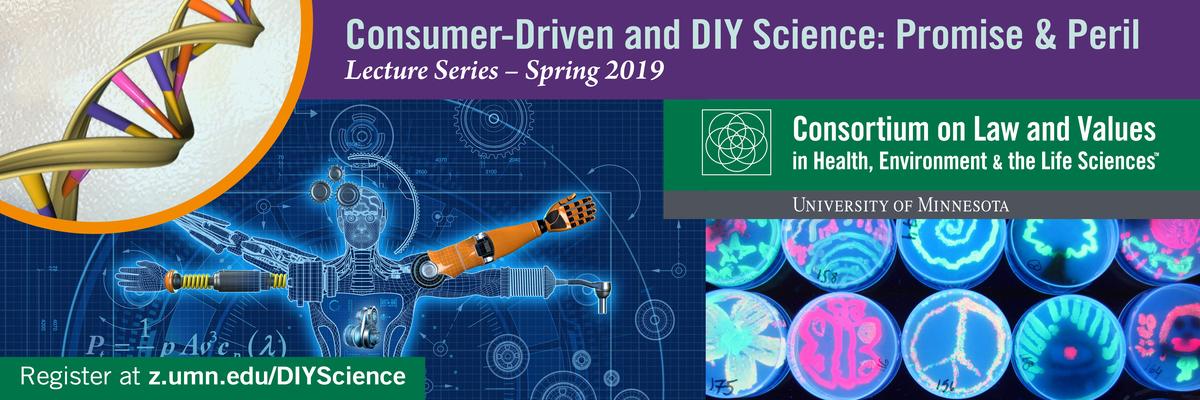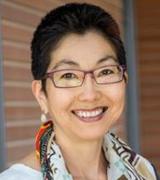
Wednesday, April 3, 2019 - 11:30am to 1:00pm
Mississippi Room, Coffman Union
Do-it-yourself (DIY) biologists set up home labs in garages and spare bedrooms, or use community lab spaces, to play with plasmids, yeast, and tools like CRISPR. Some members of this community insert magnets, RFID chips, lasers, and genes into their bodies, seeking to enhance human capacity and, in some cases, redefine themselves as cyborgs. Prof. Ikemoto examined the potential dangers of DIY bio as well as the possibility for building a new relationship between science and society that focuses on knowledge creation, equality and justice.
Commentator:
Francis X. Shen, JD, PhD
Associate Professor of Law, University of Minnesota
Executive Director of Education and Outreach, MacArthur Foundation Research Network on Law and Neuroscience
Senior Fellow in Law and Neuroscience, Harvard Law School
Affiliated Faculty, Center for Law, Brain & Behavior, Massachusetts General Hospital
Moderator:
John C. Bischof, PhD
Director, Institute for Engineering in Medicine
Medtronic Bakken Chair
Professor of Mechanical Engineering
University of Minnesota
Resources:
Ikemoto LC. DIY Bio: Hacking Life in Biotech's Backyard. UC Davis Law Review 2017;51:539-568.
Continuing Education Information:
To earn Continuing Education credits, webcast viewers must email us at [email protected] during the webcast to confirm their wish to receive CE credits. Later viewing of this video will not qualify for credit.
Attorneys: The Minnesota State Board of Continuing Legal Education approved 1.5 Continuing Legal Education (CLE) credits; Event Code is 265318.
Continuing Medical Education:
Accreditation Statement
In support of improving patient care, University of Minnesota, Interprofessional Continuing Education is jointly accredited by the Accreditation Council for Continuing Medical Education (ACCME), the Accreditation Council for Pharmacy Education (ACPE), and the American Nurses Credentialing Center (ANCC) to provide continuing education for the healthcare team.
Credit Designation Statements
American Medical Association (AMA)
The University of Minnesota, Interprofessional Continuing Education designates this live activity for a maximum of 1.5 AMA PRA Category 1 Credits™. Physicians should claim only the credit commensurate with the extent of their participation in the activity.
Other Healthcare Professionals
Other healthcare professionals who participate in this CE activity may submit their statement of participation to their appropriate accrediting organizations or state boards for consideration of credit. The participant is responsible for determining whether this activity meets the requirements for acceptable continuing education.
Educational Objectives for this lecture series are:
- Recognize the effects of DIY Bio in your clinical practice and be better prepared to treat patients who have engaged in biohacking their own bodies.
- Collaborate with citizen scientists to share information and ensure scientific and ethics best practices are followed.
- Recognize the threat arising from these activities and collaborate with public health authorities to monitor and plan for possible outbreaks/biosecurity attacks.
This activity was designed for primary care physicians, pharmacists, PAs, RNs, NPs, genetic counselors, citizen scientists/community members, researchers, biomedical engineers.

Lisa Ikemoto, JD, LLM, is the Martin Luther King, Jr. Professor of Law at the University of California, Davis, School of Law. She teaches bioethics, health care law, public health law, reproductive rights, law and policy and marital property. Her research areas include reproductive and genetic technology uses, health care disparities and public health law. More specifically, she focuses on the ways that race and gender mediate access to and influence biomedical technology use and health care. Her recent work addresses reproductive tourism, the ways in which human gamete use links the fertility and biotechnology industries and the privatizing effects of informed consent. Prof. Ikemoto is a Bioethics Associate of the UC Davis Health System Bioethics Program and a Faculty Associate of the UC Davis Center for Science and Innovation Studies.